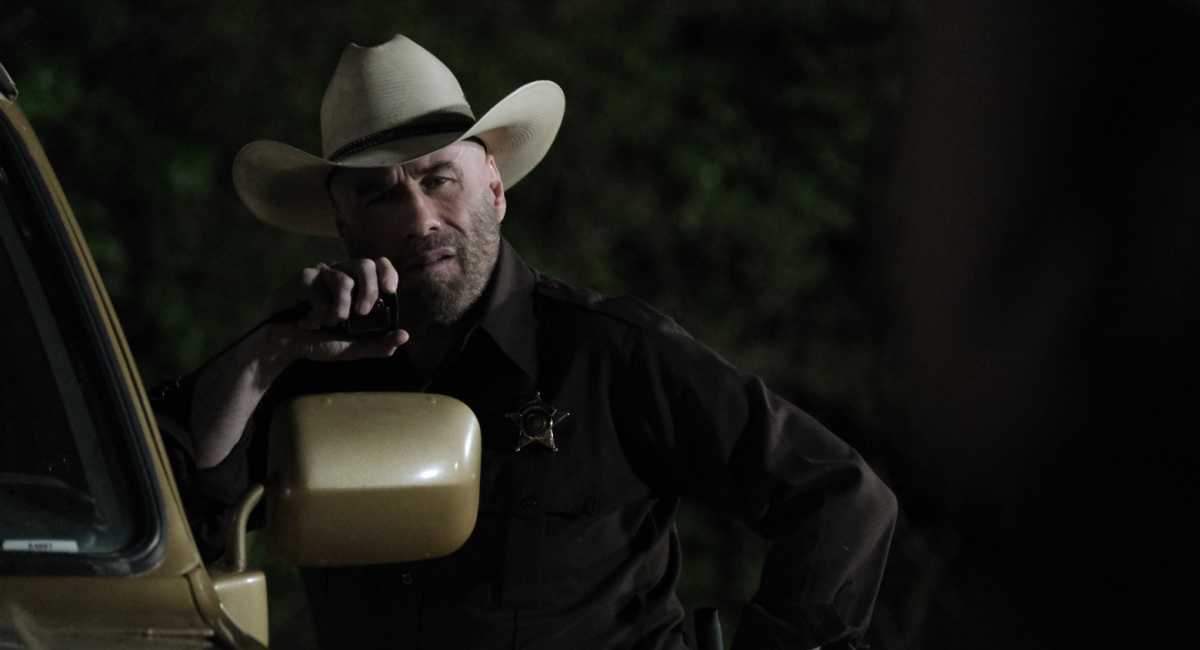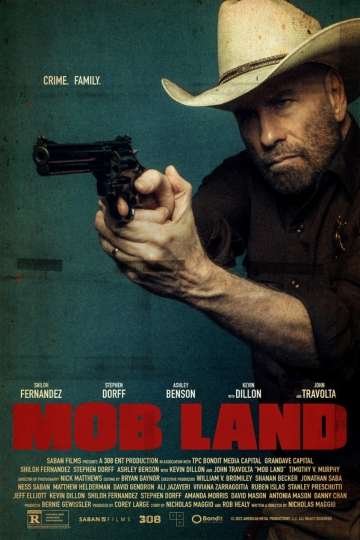John Travolta as Bodie Davis in ‘Mob Land.’
Opening in theaters on August 4th is the new action thriller ‘Mob Land,’ which was written and directed by first time feature filmmaker Nicholas Maggio.
What is the plot of ‘Mob Land’?
Deep in the heart of Dixie, in a small town struggling with the ravages of addiction, a local sheriff (John Travolta) tries to maintain the peace when desperate family man Shelby (Shiloh Fernandez) robs a pill mill with his reckless brother-in-law, Trey (Kevin Dillon). But the supposedly easy score takes a violent turn, alerting the New Orleans mafia’s revenge-seeking enforcer (Stephen Dorff), who threatens Shelby’s wife (Ashley Benson) and daughter. With its unpredictable twists and turns, Mob Land is a heart-pounding, action thriller.
“Crime. Family.”
Deep in the heart of Dixie, in a small town struggling with the ravages of addiction, a local sheriff (John Travolta) tries to maintain the peace when desperate… Read the Plot
Who is in the cast of ‘Mob Land’?
‘Mob Land’ stars John Travolta (‘Pulp Fiction,’ ‘Face/Off’) as Bodie Davis, Stephen Dorff (‘Blade’), as Clayton Minor, Shiloh Fernandez (‘Evil Dead’) as Shelby Conners, Kevin Dillon (‘Entourage’) as Trey, Timothy V. Murphy (‘Detective Knight: Independence’) as Ben, and Ashley Benson (‘Spring Breakers’) as Caroline Conners.
ECinema News recently had the pleasure of speaking with writer and director Nicholas Maggio about his work on ‘Mob Land,’ creating the screenplay, directing John Travolta, Stephen Dorff’s performance, the music and shooting a complicated scene in under an hour.
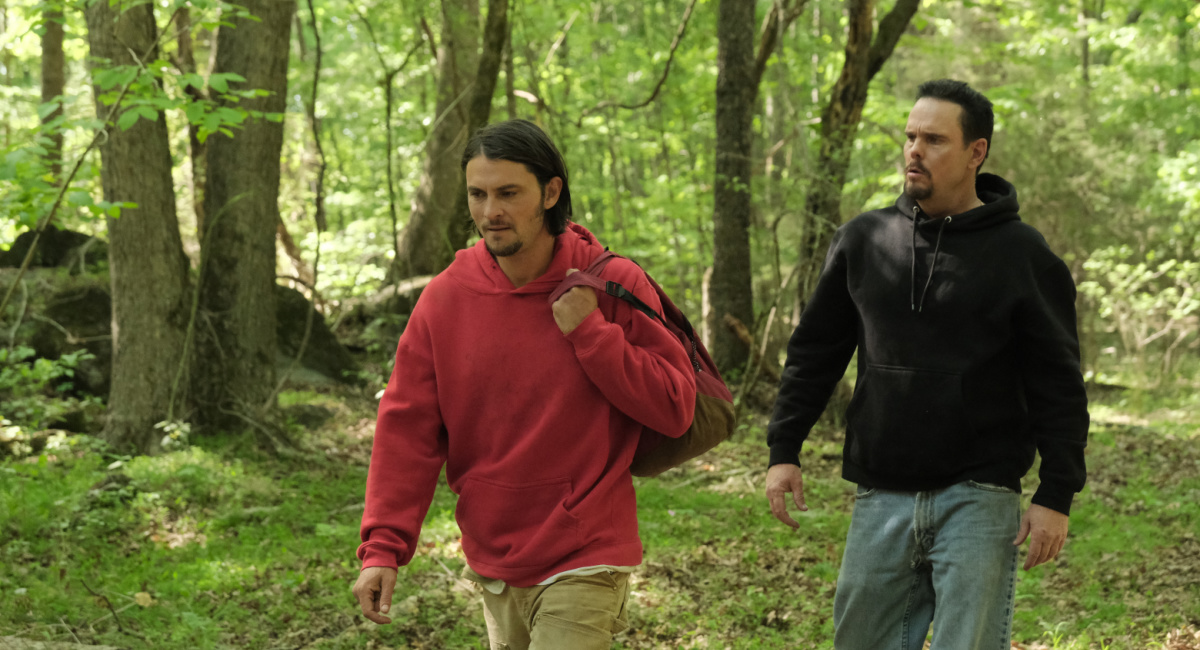
(L to R) Shiloh Fernandez as Shelby Conners and Kevin Dillon as Trey in ‘Mob Land.’
ECinema News: To begin with, can you talk about developing the screenplay and the themes you wanted to explore with this movie?
Nicholas Maggio: I’m obsessed with cars. I love the South. I love Southern Gothic stories. I love neo-noir. I spent a lot of time in the South. I was visiting some friends in northern Alabama. We were at the drag strip. I’m immersed in this culture, in this rural, Southern atmosphere, and I was like, “Man, I got to shoot a movie here. I got to write a script.” So I had that as the location, I knew it was going to take place there, and then the rest is just fiction. I just needed a catalyst to get me into this location, to meet these characters, and it was the robbery, and it was everything that went into it. That’s where the story came from. It was literally just my love for the rural South and cars and having visited there. Then, I guess, as far as themes, I think the fun thing about themes for films is I went into it with a few intentional ideas for themes, what I needed to get done as a filmmaker, what I needed to put in there thematically. But I think the fun thing is that, once the film is out and once people see it, once you see it, the audience takes what they want from it, and it doesn’t matter what my themes are, what my intentions were thematically. I think it’s just up to the viewer, the audience, to pull from it what they need from it. As far as themes, God, it’s subjective. It’s whatever you need it to be.
MF: The film is really void of any clear cut heroes or villains, was that by design?
NM: Yeah, definitely, nail on the head. I love antagonists that aren’t antagonists, and protagonists that aren’t protagonists. Ever since ‘The Sopranos,’ it’s like we fell in love with that idea. You’re rooting for the bad guy, you don’t know why, but they’re so empathetic and sweet. I’ve always been obsessed with that notion that, just because good people do bad things, does that make them bad, and if bad people do good things, does that make them good or bad? Definitely, that is something I wanted to play with, and I had a really good time doing it because everyone does some bad things in this film, and whether or not they do it for the right reasons, does that matter? It’s absolutely something that I wanted to do, that I wanted to play with, because I think that’s something that everyone can relate to in some way, whether or not they themselves are conflicted bad people doing good things, or good people doing bad things. But it’s at least something that most people can be empathetic to. If you’re put in these situations that these characters find themselves in, I think most people can understand why they’re making the decisions they do, and I think that was really fun to play with the empathy of the audience.
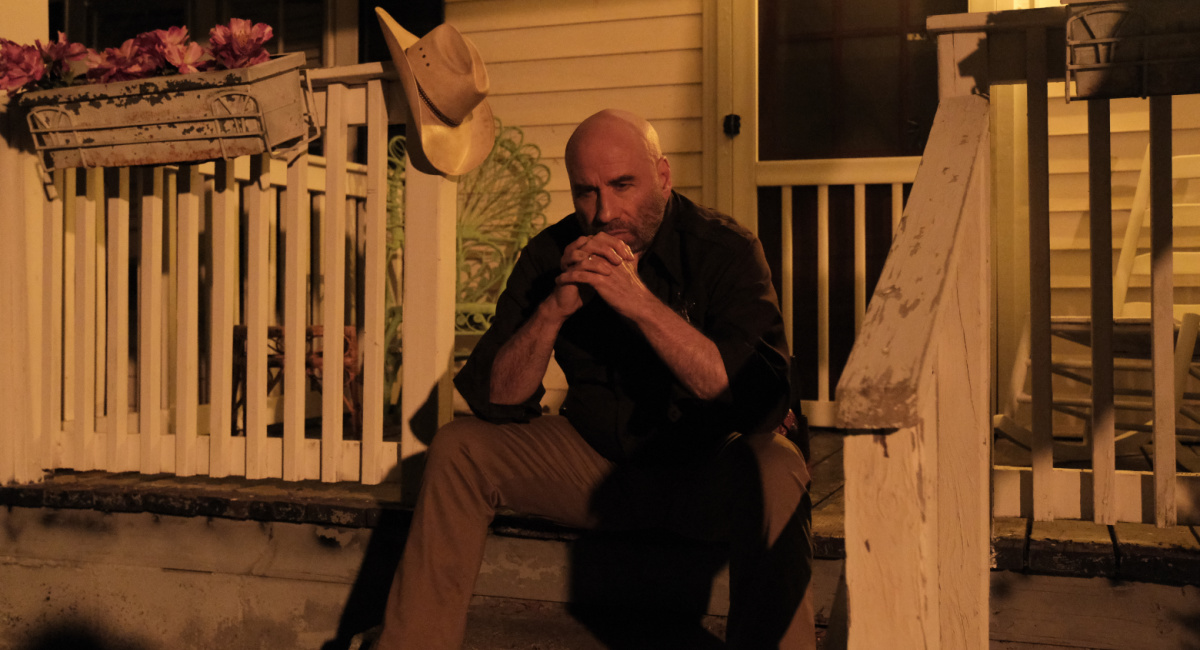
John Travolta as Bodie Davis in ‘Mob Land.’
MF: As a first time filmmaker, what was it like directing John Travolta, who is arguably one of the greatest movie stars of all time?
NM: I think anyone, first-time director or not, when you’re standing there in front of an actor, a movie star who’s been a movie star for decades, of course, it’s intimidating. Directing, in the traditional sense, I knew wasn’t going to be something that I was going to have the time or luxury to do because we had such an incredibly tight schedule. Most of the directing I did with the actors was beforehand. I tried to give them all the information. I tried to have conversations, text messages with them, answer all the questions, and then create the environments, whether production design, locations, tweaking the script for them, giving them absolutely everything they needed to do what they could do, to do what they do best, and to do the characters justice. As far as Travolta himself, he did so much homework beforehand. I based the character of Bodie on my grandfather, and on some great uncles, but he wanted to see photos of them. He wanted to know about them, how they talked, and he did so much homework in that way that, when he stepped on set, he was Bodie. He knew every line. He knew exactly the mannerisms he was going to bring to it. In the traditional sense, I really didn’t do much directing with John as far as the character was concerned, day of, on set. It was more physical or we would collaborate with blocking, or maybe he would do this and maybe he wouldn’t do that, and so that’s mostly what it was. But every actor, and John included, they just came so prepared that, thank God, because, on the time schedule we had, I wasn’t able to take the time that maybe some directors and actors would need, and I didn’t need it because they came so prepared, which was really epic to have.
MF: There were lines of dialogue that Travolta delivered in a way that only he could, and it seems that another actor may not of interpreted those lines in the same way. Did you realize that on set?
NM: Yeah, definitely. It’s so nuanced, and that’s great about really great actors. It’s the slight inflection in a word, it’s the mannerism, it’s throwing the line away when I didn’t know he was going to. It’s the little things. For the most part, it was pretty verbatim as far as the script is concerned, we didn’t deviate too much, but when we did, it was John’s idea, and it was always right. I’m not even going to pretend to know that I know acting, as a first-time director, better than John Travolta. Every time he had an idea, it’s like, “What if we cut this line and I just said this?” and it wasn’t because he didn’t want to say the lines. It was because he truly thought, and knew that that was best for Bodie in that moment, and he was always right. It was almost annoying, but the guy was right. It just came down to the little things. He’s so very John Travolta in this role, but at the same time, a lot of people who have watched it, and what I believe as well, is that he’s also uniquely Bodie Davis in this. I think that’s really fun, and I think that’s what a movie star is. You see it’s them and they’re doing it, but they’re also giving you something maybe we haven’t seen before from that actor, which is exceptionally fun to watch with him.
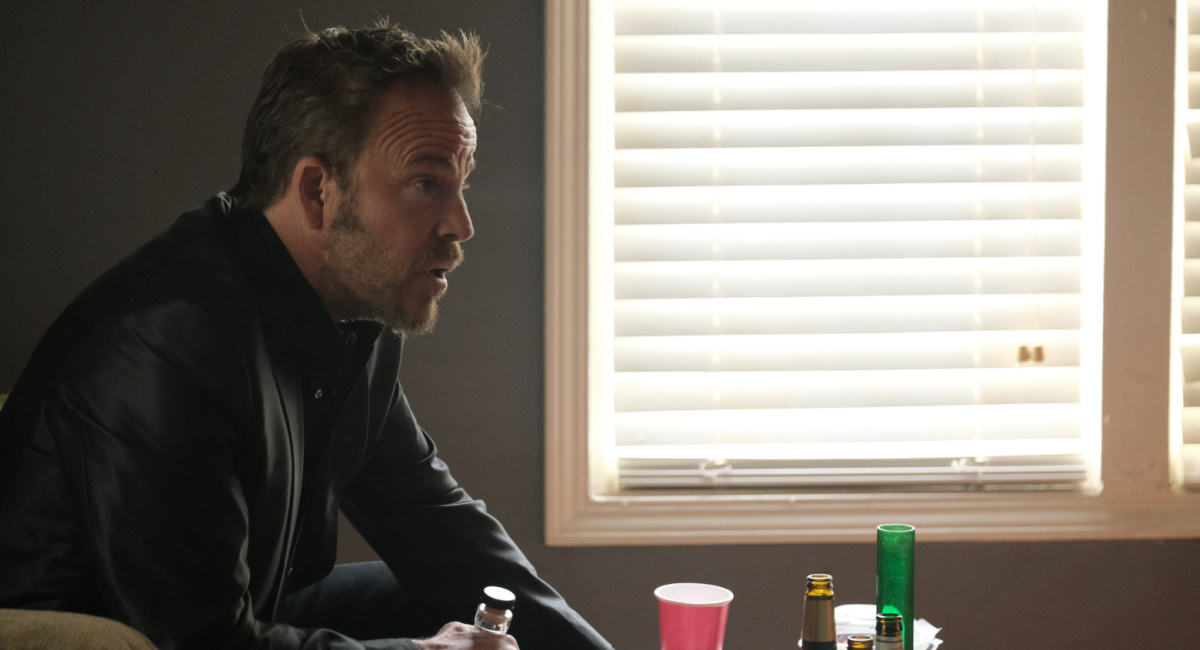
Stephen Dorff as Clayton Minor in ‘Mob Land.’
Related Article: Emile Hirsch Talks ‘The Price We Pay’ and Working with Stephen Dorff
MF: What was your experience like working with Stephen Dorff?
NM: Stephen is such an integral part of this whole thing happening, so I got to give my props to Stephen. He was the first one that read the script. He was super excited. I pitched Shiloh’s name to Stephen and he was like, “Absolutely, I’m on. I love Shiloh.” He got it to Travolta. Travolta read it. They talked. Stephen was a huge part of that. He was a champion of mine very early on. We had a pretty blunt conversation, the very first conversation, and Stephen has a way about him. He’s known for being pretty bold, and he was like, “Hey, don’t mess this up. Are you going to mess this up? How are you going to do this?” Once I got him on my side and I gave it to him how I thought, he was on my side the entire production, which was epic. I do have to give props to Stephen for that. Oh, my God, he’s so good. He’s so beautiful on camera. He’s so fun to watch. His face is just perfect for the type of light, for the type of filming we were doing, and then he is such a great actor. I am biased as hell, but I think this is his best role. It’s my film, and he said my words, but, God, he’s so good in it. It’s fun that everyone who watches it says, “Stephen was so great,” and because he is, he’s so good in it.
MF: Can you talk about Dorff’s character, Clayton, his point of view and what he’s searching for in his life?
NM: I think the fun thing about Clayton is that he lives by his own set of morals that he deems righteous, but also what he’s doing is all of these rules that he set for himself and the questioning of the locals and trying to understand them in his way, knowing that he’s not going to understand them, is all just means to justify the horrible stuff that he does. He’s conflicted. He knows what good and bad is. He knows the difference. He’s not a sociopath. He’s not a psychopath. He truly understands. He’s just looking for meaning like everyone else, but on top of that, he’s looking to justify everything he does, and so he’s constantly searching for justification for the violence, for his way of life. That’s so much fun in the arc of the story is that he does get to understand a little bit of it, and by the end, he does have an understanding through especially the last conversation with Shelby (Fernandez), he does have this understanding of what it means to be in Shelby’s shoes type of thing. That’s the crux. That’s what gives us the ending that it is with Clayton.
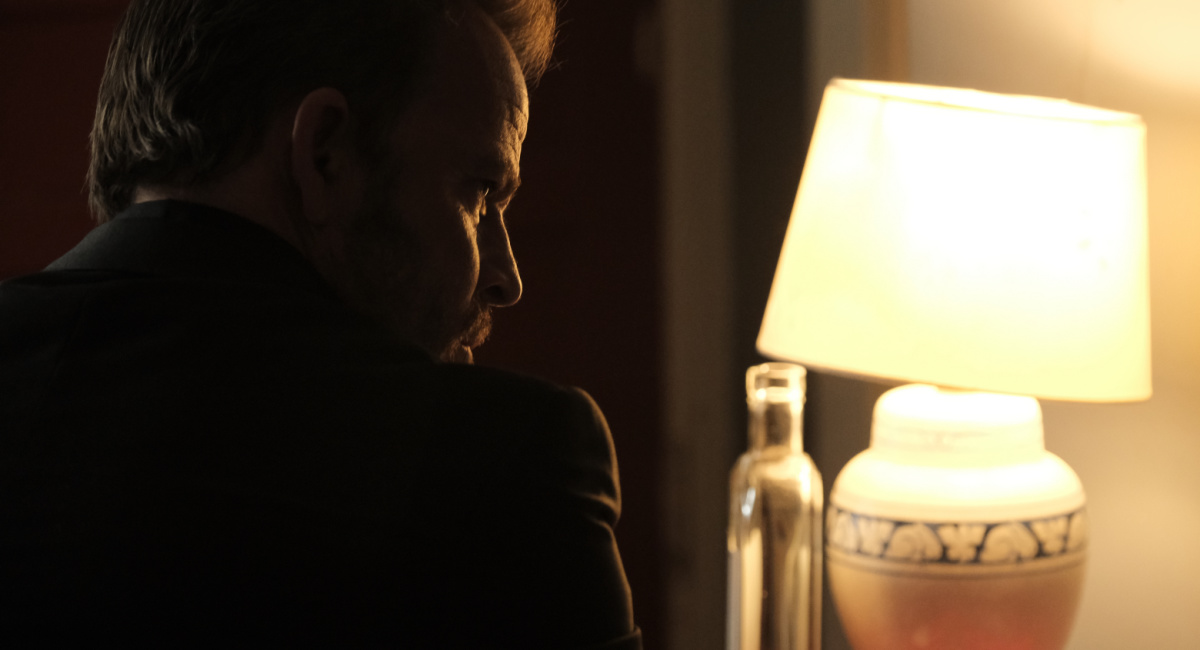
Stephen Dorff as Clayton Minor in ‘Mob Land.’
MF: Can you talk about your musical choices in the movie and how those particular songs helped to create a specific tone for each of the characters?
NM: I love you for even mentioning it, because we had no budget for music. We just didn’t. All of the songs outside of score are friends of mine that gave it to me for free, whether it was Devlin McCluskey, the singer of The Dead Ships, who did that unreal cover of “House of the Rising Sun,” he recorded that in his bedroom, or whether it’s Jason Dodson from The Maldives who wrote and recorded that song during the credits. He did that after he read the script. He still hasn’t seen the film. The song that plays while he’s walking to the carwash and back, that is another friend of mine. That’s his band who did that. The metal song that plays during the chase scene is a straight edge, hardcore band out of Birmingham, Alabama, called No Cure that I hit up, and they gave me a song for free. I’m lucky enough to be involved in music as just a massive fan, and being such a fan of music, I’ve met some really great people who were willing to give me this music for free. Massive shout-out to all of the bands, Mind’s Eye out of Denver, the song that’s playing when Kevin Dillon was driving the Honda. Everything was given to me, so just huge thanks to all those people. I was up against it because it really made me search for songs that were accessible. I couldn’t use Journey. I couldn’t use Styx. I had to find songs that I could actually get access to, but because of that, it was a really great thing because it let me get very personal with it. They are songs that really mean something to me because most of them are friends’ bands that really have spoken to me over the years or whatnot. That was really fun to do.
MF: Finally, can you talk about the challenges of shooting the bank heist and care chase sequence?
NM: I’ll maybe blow your mind a little bit. From the time when they have the guns, to the time they run out of the bank, that entire sequence, I shot in 48 minutes. We were on an incredibly tight schedule for the entire principal, and it was one of those things where things were stacked up. We had the location at a certain time. We had the stunts, and we did everything in 48 minutes, to the point where, when we’re in the red room during the robbery, King Orba, who plays Rip, Shiloh Fernandez, and Kevin Dillon, the three of them are in there, and there’s no master shot. We went in there with two cameras, and I told them, “Guys, I am so sorry, but we have three takes,” and all of them immediately were like, “Yep, let’s go. We got it,” and they just nailed it. What’s so beautiful about that is that Rip was going to take his time during the robbery. He was going to deliver these lines very methodically. He was a different character up until, literally, two minutes before we shot. Then King flipped it, and the way he rattles those lines off, it really heightens the entire scene, which ended up being a blessing. I cut a few lines out, I cut a few actions out, literally as we were shooting, and it gave this heightened sense of urgency, stress and anxiety to the scene. I don’t think we would’ve gotten otherwise. Those guys, the three of them are such great actors that they just delivered for three takes and we were done, and God bless them. I lucked out time and time again, whether it was with cast, the crew, or with locations. That’s what filmmaking is. It’s stars aligning, and time and time again, we lucked out.
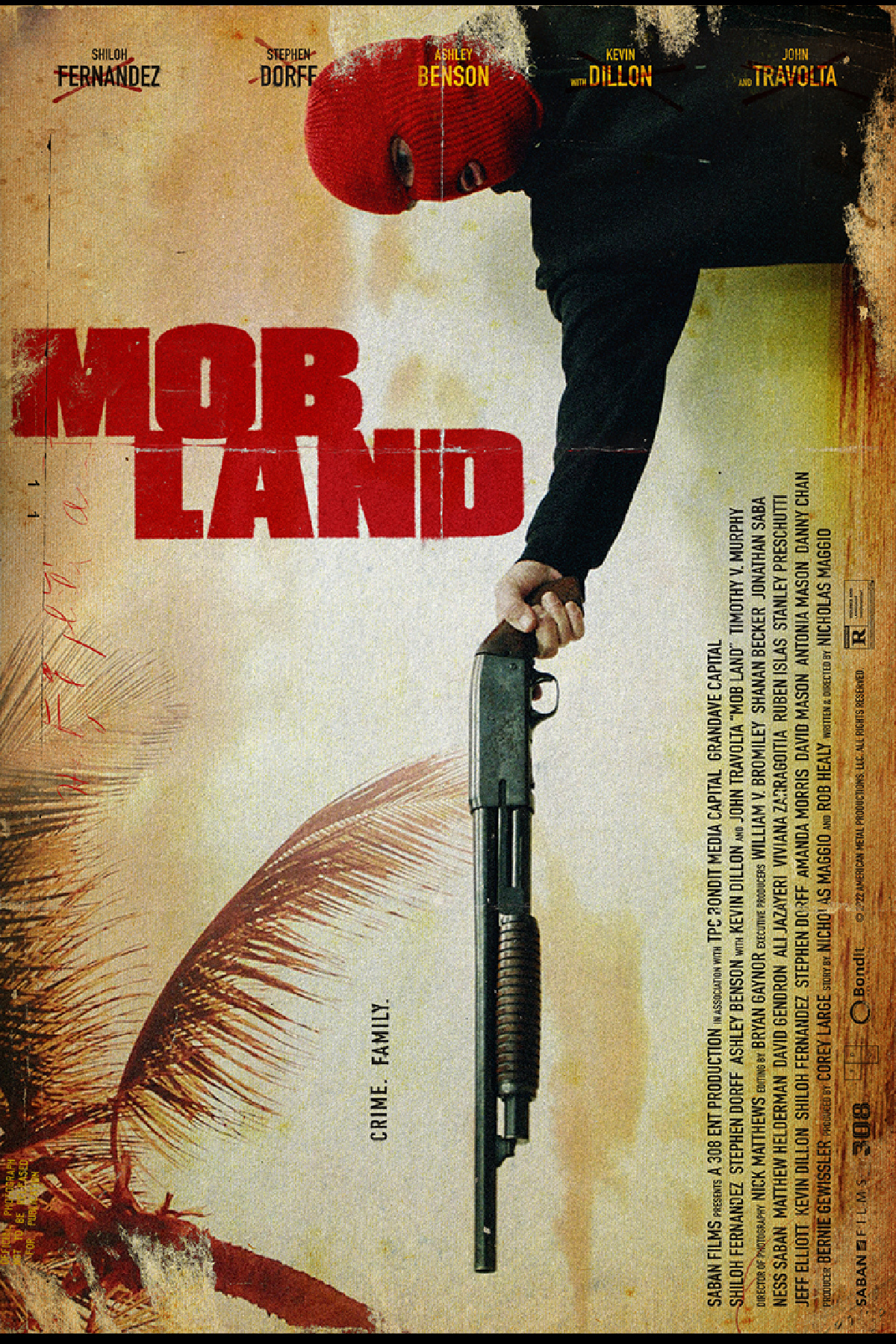
‘Mob Land’ opens in theaters on August 4th.
Other Movies Similar to ‘Mob Land’:
Buy John Travolta Movies On Amazon
‘Mob Land’ is produced by 308 Enterprises, Three Point Capital, BondIt Media Capital, and Grandave Capital. The movie is scheduled to release in theaters on August 4th, 2023.
Content Source: www.moviefone.com

